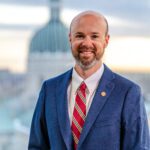Read part 1 here.
Like an outwardly working concentric circle, religious liberty hinges upon an understanding of (1) individual assent, (2) group association, and (3) institutional distinction. These are reflected in the practices of individual conversion and regenerate church membership, which entails a distinction between membership in the church and membership in society, and the institution of the gathered church being distinct from the institution of the state.
Individual assent
As I began to understand religious liberty at its most philosophical core, an emphasis was placed on the individual’s stance before God: nothing is to stand between the individual and God, not chiefly the state, nor the family. Known as “Soul Competency,” this was and is the most important principle to religious liberty from an anthropological perspective.
As free agents, individuals have to voluntarily come to religious truths based on their own grasp of its truth and its merits. Every individual, on their own terms, has to give an account for who they believe God to be. I cannot make that decision for others, nor can others make that decision by proxy for me. The reality of accountability and forewarning of judgement is baked into the idea of religious liberty. As the New Testament speaks of a day of individual reckoning, each person has to answer for their conscience (Heb. 9:27). If God is the rightful judge, human institutions, by writ of their own infallibility, cannot be. A person can be instructed and argued with, but their conclusion about who God is must be their own decision with their own volition and will. A certain individuality punctuates religious liberty without devolving into individualism. Religious liberty implies a conversionary foundation; not religion by osmosis or absorption. Individuals have to arrive at conclusions consciously.
This meant and still means that forms of baptism and church membership that do not hinge upon the individual’s expressed faith are invalid in my view. This is why Baptists have put an emphasis on the notion of being “born again” to enter the kingdom of God (John 3:3, 2 Cor. 5:17). Authentic faith is self-chosen and results in the growth of new affections. We do not merely shuttle between belief and unbelief. We believe a radical disjunction has occurred for Christ has “delivered us from the domain of darkness and transferred us to the kingdom of his beloved Son” (Col. 1:13). This idea of conversionary primacy looms supreme in discussions on religious liberty because it understands both coercion and nominalism as co-equal threats: if there’s a religious body with people who have not made the same profession of faith or who have made such a profession under false pretenses, how can I be sure that the community is composed of authentic believers united around the same truths and mission? This reality rules out any religious body that practices infant baptism since infant baptism attempts to effectuate some type of covenant membership without individual assent even being possible.
Group association
The necessity of justification by personally-believed faith led me to a very important conclusion in my ecclesiology: The best form of ecclesiology is one composed only of those individuals who have joined together under the same banner of explicit conviction and profession. Membership in the church is not just generic membership in a social organization. It’s a body of believers united around the same mission and purpose. Thus, only those believing the same truth about Jesus Christ should be baptized and recognized as members of the local church assembly.
This is known as regenerate church membership. Such a practice reflects the argument for believers’ baptism, another key Baptist distinctive. It means that forms of ecclesiology that consider members to be those who have not personally assented to Jesus’ kingship and experienced regeneration are not true members of the church and not eligible for baptism. The church is not an exclusionary society, as salvation is available to all who call on Christ. It is, however, exclusive, on the grounds that its make-up consists only of those sharing a commitment to common truths. Only those consciously expressing faith may be baptized, which makes up the true church. From there, regenerate church membership establishes the practice of church discipline, because it is only those members who are truly considered regenerate that are held accountable to the community’s standards of sanctified fellowship.
It is the distinguishing marks of the church’s essence and practices that establish the need for religious liberty in order for the church to be true to its calling before God and humanity. The church has a separate authorization and separate practices from the society around it and the government above it. Christians intermingle with the rest of society while understanding themselves as sojourners and exiles.
Institutional distinctions
Regenerate church membership implies that the church is not thus simply synonymous or coterminous with the state or society around it. One is not a Christian just because they live in a country influenced by Christianity. Rather, to be a Christian is to be part of a called-out body, the church, which is distinct from other types of associations and autonomous, another Baptist distinctive. The church, being an institution of professed faith marked out by believers’ baptism, exists by right of its own authorization, not the state’s allowing or calling it into existence. The church and state are both divinely authorized, but with distinct callings and jurisdictions. The church is on mission in society and is concerned with the eternal destiny of humanity; the government is concerned with temporal affairs, like making sure that wrongdoing is punished, and laws exist which make society inhabitable. In past arrangements, where church and state often overlapped or were formally united with each reinforcing and intermingling with the other, Christianity was ameliorated to the culture around it and used as a prop for social uniformity.
If someone one was to ask me how to destroy a vibrant church, my answer would be a combination of infant baptism and church-state union. These, together, would unravel religious liberty by unraveling the cohesiveness of regenerate Christian identity and ecclesial distinction. Here, cultural preferences are deemed sufficient enough to make someone think they are a Christian while church membership is diluted down to membership in society. One of the greatest arguments against the union of church and state is the history of the union of church and state, which has produced dead churches and pseudo-Christians.
Conclusion
For fear of being misunderstood, I am not arguing that other ecclesiastical arrangements are hostile to religious liberty. I am thankful for godly Presbyterians, Lutherans, and others who stand for religious liberty. My argument is, rather, that a rightly ordered account of religious liberty bears the richest fruits within a Baptist ecclesiology.
Religious liberty implies a recognition that individuals make conscientious decisions to participate in group associations that have different requirements and different callings than are synonymous with the rest of society and the state. In my view, this leads one to the four walls of a Baptist church.










